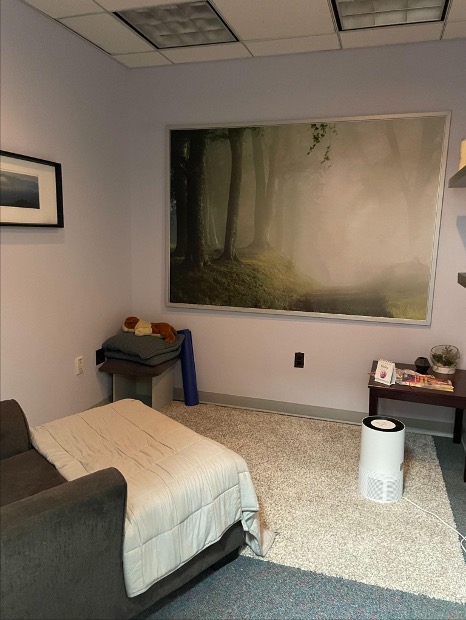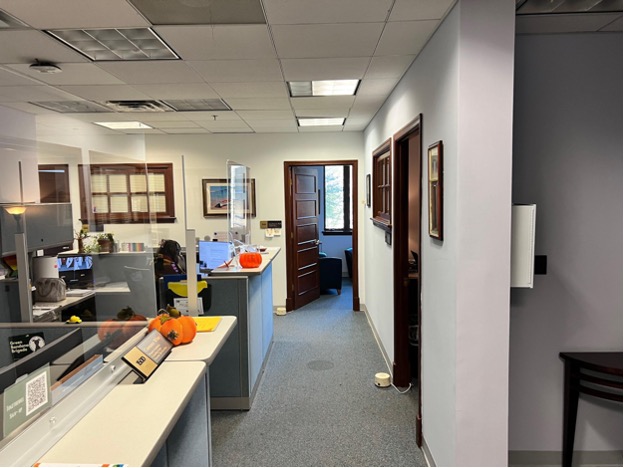The following does not represent the views of Loyola University Maryland, the Greyhound, or Loyola University’s Department of Communication.
As summer fades into autumn and winter approaches, college students face increasing pressures, including coursework demands, readjustment to campus life, and more recently the election. This transition period often brings significant stress and emotional challenges for students to navigate.
While most college students have personal support systems and coping mechanisms, Loyola University Maryland has a responsibility to promote initiatives that bolster student mental health. I wanted to investigate further into the effectiveness of the university’s current mental health resources based on accounts from various students and staff members.
Mental health support on college campuses has evolved significantly, with institutions recognizing the need for diverse and comprehensive resources. At Loyola University Maryland, the Counseling Center serves as a primary resource. Other specialized departments and initiatives exist, such as Disability and Accessibility Services (DAS), the Mental Health Task Force (MHTF), the ALANA (African, Latinx, Asian and Native American) Services Department, online platforms like Together-All, and more.
The university makes commendable efforts to connect students with therapists in Baltimore who may better suit their needs, using websites like Welltrack Connect. They also work closely with case managers like Ejuma Adoga, Case Manager for Student Support and Wellness Promotion, to help connect students with resources during and after medical leave. She also works with her colleague Stephanie Bravo, to connect and support students of concern, as part of the care team.
“I’m really big on collaboration, and something that is on the back of my mind is that stress and mental issues pop up in all areas of life and manifest in different ways, which is why most students end up here. They are at the Counseling Center talking about their feelings but they have a bill to pay or need a lawyer, which we can help with. As they take care of their emotions, we take care of more practical stuff. That is how we stay interconnected,” Bravo said.
Despite the availability of these services, some students may encounter personal hurdles when accessing them. Misconceptions about mental health persist, along with social stigma surrounding diagnoses that discourage help-seeking behavior. The Counseling Center, in keeping with anti-oppressive counseling practices, does not diagnose students.
Students with specific needs also often struggle to connect with their families due to differing perspectives on mental health.
Sebelewengel Nadew, ’27 said, “With my parents, even though they agreed that I needed to take my medication, there were times where they did not understand all the symptoms I had. It was very hard for them to grapple with the fact that I had something debilitating and hindering my ability to be present and remember.”
Although these resources are valuable, strong pressure has been put on these departments to accommodate thousands of students perfectly, regardless of the demanding and time-consuming nature of the work. Some students have expressed frustration over the short duration of counseling sessions, although there is evidence demonstrating that most students get their needs met in five to six sessions on average, and the Counseling Center is open to accommodating returning students.
Another concern is that, despite the university’s extensive promotion of its mental health services like the Anxiety Toolbox and others, the constant competition from various departments for student attention can overshadow these crucial resources, making it difficult for students to access the support they need.
One narrative did catch me off guard. Terrence Obuah ’25 recounts an experience where his counselor struggled to understand his cultural perspective.
“As a Nigerian coming from a predominantly white environment, I want to meet new people and cultures. The counselor I was talking to did not fully understand that perspective. Mid-session she says she wants to bring two Black counselors into the room. They were comforting, but I was in shock and my anxiety kicked in. After she did that, I wondered whether I wanted to go back because I was not mentally prepared for that; it was overwhelming,” Obuah said.
This situation, although the only case I have heard of, raises concerns about their ability to effectively serve a diverse student body. Furthermore, the absence of counselors that are fluent in other languages, such as Spanish, is notable given the increasingly diverse demographic on campus.
The Green Bandana Brigade’s visual expressions of solidarity via green bandanas on backpacks aims to provide comfort and raise awareness for mental health support. I believe there is also merit in considering similar approaches for further intersectional support. For example, both mental health and religious support are crucial aspects of student well-being, and visual cues for either could effectively create a sense of community and accessible support on campus. Ultimately, the goal is to ensure students feel supported in various aspects of their lives, whether it’s their mental health or religious identity.
Despite these concerns, many students do report positive experiences.
Princess Lisa Olamide Omotosho ’27 said, “It’s more like a conversation; it’s her helping me get through my battles or whatever is going on.”
This sentiment reflects the warmth of all staff members who genuinely care about student well-being, as has been the same in my experience interacting with them.
Sebelewengel Nadew ’27 praises the DAS program.
“Once you are signed up with the program and give them the medical documents proving your disability affecting your learning, they will send whatever accommodations you need as quickly as possible,” Nadew said.
At the end of the day, we all will face difficult times at some point. While Loyola offers a variety of services, this should reassure current and incoming students—it also highlights areas for growth. Loyola must continue working hard to incorporate intersectionality into its approach to mental health care and improving outreach efforts.
Students are encouraged to take advantage of available resources during their time at the university but should also provide feedback actively so that their diverse needs are met. By working together, the Loyola community can strive for a more supportive environment that prioritizes mental health and well-being for all students.
For more information on the Counseling Center, click here.













































































































